
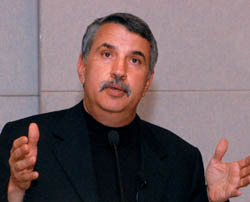 Lubin Lecture Series Features Author Thomas Friedman
Lubin Lecture Series Features Author Thomas Friedman
Three-time Pulitzer Prize-winning New York Times columnist and author Thomas Friedman addressed undergraduate and MBA students and alumni at NYU Stern in the spring. His provocative lecture, based on his book, The World is Flat, was part of the Lubin Lecture Series, which provides a public forum to discuss economic, financial, and management principles and theories.
“The global economic playing field has been leveled and Americans aren’t ready,” Friedman told the audience, before launching into a description of the three phases of globalization that precipitated this flattening of the world. Globalization 1.0 (1492 to 1800) was driven by nation-states seeking resources and imperial conquest, and shrank the world from large to medium. Globalization 2.0 (1800 to 2000) was led by companies, and shrank the world from medium to small. The current phase, Globalization 3.0, began in 2000, and is being driven by empowered individuals across the globe.
Friedman discussed the implications of each of “the 10 events that flattened the world,” beginning with November 9, 1989, the day the Berlin Wall came down and allowed people to think of the world as a single space. The launch of Microsoft’s Windows 3.0 operating system occurred around the same time and gave everyone the ability to create his or her own digital content. When Netscape went public on August 9, 1995, it signaled the beginning of the dot.com boom and helped fuel a $1 trillion investment in fiber optics within five years. This over-investment drove down the cost of transmitting content and opened up countries with well-educated workers, such as India, China, and Russia, to “the work flow revolution.” The “work flow revolution” plus interoperable software equals collaboration, Friedman explained. And that adds up to a flat world.
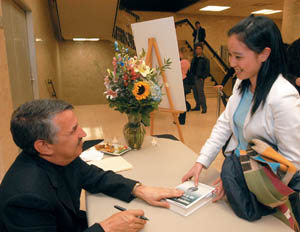
Thomas Friedman autographs his national
best-seller, The World is Flat.
|
The six other flatteners weren’t historic events, but rather new ways for individuals and companies to collaborate on work and share knowledge that capitalize on and extend the “work flow revolution.” The first two, outsourcing and off-shoring (or moving a factory off-shore) are familiar and will become even more common, he predicted. The third flattener is “uploading” or “open sourcing” – i.e., using open-source software so that engineers can collaborate online and work for free. The fourth is supply-chaining, which Wal-Mart has mastered with unparalleled control on a global scale. The fifth, in-sourcing, is a specialty of UPS, which handles computer repairs for Toshiba and myriad other behind-the-scene tasks for many other companies. Google and other search engines are examples of the sixth flattener, or “informing,” which allows anyone to mine data and collaborate.
All of these ways to share and recast work will be accelerated anywhere and to any electronic device by wireless technology, voice over internet technology, and file sharing – the tenth flattener that Friedman dubbed the “steroids.” He further predicted that the convergence of technology, so much a part of the first years of the 21st century, will be surpassed by a technology revolution of a magnitude that will rival the introduction of the printing press.
Illustrating the speed of change and the benefits of technology, The World is Flat was available in a new, updated 2.0 version after the lecture. But it was still signed by the author the old-fashioned way, by putting pen to paper.
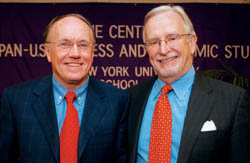
Nobel Laureate Edward Prescott (left)
with Dean Thomas Cooley. |
A Conversation with Nobel Laureate
Edward Prescott
This spring, Edward Prescott, the 2004 Nobel Laureate in Economic Sciences and 2005-2006 NYU Stern Shinsei Bank Visiting Professor in Economics at Stern’s Japan-US Center, held an open dialogue with NYU Stern Dean Thomas Cooley and Stern students about the global economy. The wide-ranging conversation between a former teacher and student – Prescott was Cooley’s thesis advisor at the University of Pennsylvania – covered Japan’s “lost decade,” European productivity, and US debt.
In discussing what caused Japan’s “lost decade” of the 1990s, Prescott described a fall in productivity and a lack of investment. Between 1983 and 1992, Japan experienced tremendous growth and an increase in productivity, he noted. But during the 1990s, productivity halted, in part, due to the government’s subsidizing of inefficient banks that became insolvent because of falling real estate prices.
Prescott, who won the 2004 Nobel Prize for his contributions to dynamic macroeconomics, also detailed how high European tax rates on labor are affecting output in that region’s economy. Although European productivity per hour worked equals that of the US, Europeans work an average of 19 hours per week (when adjusted for holidays and sick time), while Americans work 30 percent more hours. Why the difference? The typical European tax rate on labor, including consumption taxes, is 60 percent, while the US tax rate is 40 percent. This 20 percent difference in tax rates has fostered what Prescott calls “a contagious case of laziness,” with Europe “throwing away” 20 percent of its output.
The distinguished economist – Prescott is the W. P. Carey Professor of Economics at Arizona State University W. P. Carey School of Business and senior monetary advisor to the Minneapolis Federal Reserve Bank – is not worried about the “doom and gloom” scenarios related to the large US trade and current account deficits, as long as the US continues to make more money on its investments abroad. “The accounting just doesn’t make sense,” he said. Prescott suspects that the current account deficit, which recently has been around 5 percent of GDP, would be closer to 2.5 percent if the international activities of multinational corporations were accounted for correctly. |
Lifelong Learning Covers Forensic Accounting, Real Estate
In the spring semester, the Lifelong Learning Workshop Series afforded NYU Stern alumni the opportunity to learn about the expanded role of forensic accounting, and the opportunities presented by real estate investments. Each half-day workshop began with a faculty lecture, followed by a panel discussion or presentation with industry experts and a Q&A with the audience.
The series, developed in conjunction with the Programming Task Force of the NYU Stern Alumni Council, creates substantive programming to engage alumni in the academic life of the School. The initiative was spearheaded by Council members John Williams (MBA '95) and Tom Fogarty (MBA '01).
In June, Seymour (Sy) Jones (MBA '54), clinical professor of accounting at NYU Stern, led the workshop entitled “Forensic Accounting: The Anatomy of an Investigation,” which included a presentation by Ted Martens, partner and New York region leader of dispute analysis and investigations at PricewaterhouseCoopers, and a networking luncheon.
Jones noted that the recent spate of accounting fraud episodes has changed the role of both forensic and auditing accountants. Historically, forensic accountants' roles were to work within the legal system, providing expert testimony in dispute resolutions and litigation. Today, forensic accountants have become fraud investigators tasked with detecting, interpreting, and preventing financial statement fraud.
Outlining the methods forensic accountants use to examine potential fraud, Martens said forensic accountants begin by reconstructing relevant financial transactions using available data, then trace the path of targeted funds, provide evidence for investigation, and provide leads for follow-up investigative steps. They do so by interviews and reviewing all relevant documents. To prevent fraud, Martens recommended that companies implement a process of internal audit control, develop policies to encourage and protect whistleblowers, and be prepared for the worst by devising a robust fraud response plan.
In May, Harry Chernoff, clinical associate professor of information, operations, and management sciences at NYU Stern, led the workshop on “The American Dream: Building Wealth through Real Estate Investments.” The panelists were Debrah Lee Charatan, president of Debrah Lee Charatan Realty and founder of Bach Realty, the first woman-owned real estate brokerage firm in New York City; Max Kamhi, co-founder of Orbis Properties LLC; and Marlon Matza, senior vice president of Georgetown Partners Inc. and managing general partner of Gould Investors L.P.
Real estate, Chernoff noted, can be an effective investment as it provides an opportunity for passive income. But Chernoff urged investors to buy assets, not liabilities. “Assets are something that puts cash into your pocket and liabilities are something that takes cash out of your pocket,” he said, relating some ideas from Robert Kiyosaki's Rich Dad, Poor Dad. Chernoff also suggested keeping emotion out of investment decisions, and recommended that people not live in an investment property unless they are prepared to expend a lot of work hours during their evenings and weekends. The panelists explored the ins and outs of today's real estate market and answered audience questions on a range of topics relating to real estate investment.
Social Entrepreneurs Gather at NYU Stern
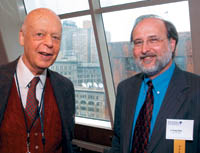
Professor William Baumol (left), academic director of the Berkley Center, with J. Gregory Dees of Duke University. Dees spoke about social enterprise and innovation at the Conference of Social Entrepreneurs. |
NYU Stern’s Berkley Center for Entrepreneurial Studies hosted its third annual Conference of Social Entrepreneurs in April. Sponsored by NYU Stern’s Stewart Satter Social Entrepreneurship Fund, the Ewing Marion Kauffman Foundation, and the Citigroup Foundation, the conference attracted nearly 300 students, alumni, social innovators, and scholars to discuss best practices, trends, and innovations in the way people around the world are using entrepreneurial and business skills to create innovative approaches to social problems.
The morning keynote speaker, Dr. William Magee, founder of Operation Smile, described the work of his nonprofit volunteer medical services organization that provides reconstructive surgery to economically disadvantaged children and young adults. In a powerful and moving address, Magee showed before-and-after pictures and told stories of the 100,000 lives his organization has touched since its founding in 1982. Magee said that Operation Smile’s successful corporate partnerships are the cornerstone of its financial sustainability.
At a cocktail reception that kicked off the conference, Stern alumnus Scott Berrie (MBA ’99) received the inaugural Stewart Satter Social Entrepreneur of the Year Award. Berrie, president and co-founder of Scojo Vision and Scojo Foundation, and his partner, Dr. Jordan Kassalow, created the Scojo Foundation to increase the number of people with access to affordable reading glasses, while creating jobs and facilitating access to comprehensive eye care. The foundation trains local entrepreneurs, many of whom are women, in India, El Salvador, Guatemala, and Bangladesh, to give basic eye exams and sell low-cost reading glasses in their communities. Scojo Vision, the foundation’s sister for-profit company that designs high-end eyewear, donates 5 percent of its profits to the foundation.
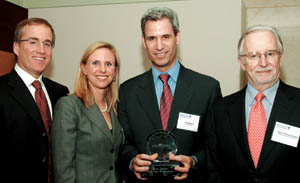
Stern alumnus Scott Berrie received the Stewart Satter Social Entrepreneur of the Year Award. From left to right: Stewart Satter; Sarah Chiles, director, Entrepreneurship Program at the Berkley Center; Scott Berrie; and Dean Thomas Cooley. |
The Satter Award was launched in 2004 through the generous support of Stern alumnus Stewart Satter (MBA ’82). In a recent conversation with first-year MBA students, Satter, a member of the Stern Board of Overseers and CEO of Consumer Testing Laboratories, spoke of his business career – he built a family consumer testing business into a 1,000-employee firm – and of his passion for social entrepreneurship. Satter created the Stewart Satter Program in Social Entrepreneurship to support educational initiatives and foster social venture creation within the Stern community. The Satter Fund, an innovative arm of the program, is modeled on a real-world foundation or venture philanthropy fund.
NYU Stern Dean Thomas Cooley discussed how the School has embraced the potential for business to help foster social change and has integrated social entrepreneurship into the MBA program. “Students are recognizing our efforts in social entrepreneurship, and because of this, they are drawn to Stern,” he said.
Other speakers at the conference included J. Gregory Dees, faculty director of the Center for the Advancement of Social Entrepreneurship at Duke University, who spoke about the increasing convergence between the two social entrepreneur schools of practice – social enterprise and social innovation; and David Bornstein, author of How to Change the World, who discussed the future of social entrepreneurship and emerging trends. Participants in the research roundtable, What We Don’t Know about Social Entrepreneurship, moderated by Jeffrey Robinson, NYU Stern assistant professor of management, acknowledged that research in social entrepreneurship is in its infancy.
Salomon Center Events Focus on Risk
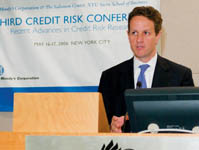 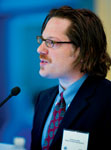 |
President of the Federal Reserve Bank of New York Timothy
Geithner (left) gave the keynote address at the Credit Risk
Conference. Roger Stein, managing director at Moody’s Investor
Service, a conference co-host, moderated. |
More than 340 credit-risk practitioners and academics gathered to share ideas and insights on advances in credit risk research at the Third Annual Credit Risk Conference, hosted by Moody’s Corporation and NYU Stern’s Salomon Center last spring.
Highlights from the conference included keynote speakers Timothy F. Geithner, president of the Federal Reserve Bank of New York, and Myron S. Scholes, Nobel Laureate and chairman of Oak Hill Platinum Partners. Geithner spoke about credit derivatives and the economy in a session moderated by Thomas Cooley, dean of NYU Stern School of Business. Scholes discussed issues in the evolution of credit markets and credit derivatives with moderator Roger M. Stein (MPhil ’98, PhD ’00), managing director at Moody’s Investors Service.
“This conference is a tremendous platform for top industry participants and academics in credit risk to come together and exchange views on recent industry innovations in credit markets and unveil research and analytic advances that are still in development,” said Stein.
Edward Altman, Max L. Heine Professor of Finance at NYU Stern and a long-time observer of the high-yield debt market, noted that credit risk research and resources have undergone a revolution. “Yet our markets remain vulnerable to major shocks, partly due to the uncertainty of banking regulation,” he said. “Researchers and practitioners are still searching for better ways to manage credit risk.”
The Salomon Center, which focuses on research in the field of financial economics, has also recently started an initiative focused on an important risk management tool: derivatives. In June 2005, the NASDAQ Stock Market Educational Foundation awarded the Salomon Center a three-year, $300,000 grant to support the NASDAQ Derivatives Research Project, which promotes interaction between academics and practitioners. A guiding principle of the NASDAQ Derivatives Research Project is that the top academics and practitioners in the area of derivatives and risk management conduct research at a comparable level of rigor, and that they have much to gain from sharing ideas.
Earlier this year, the Project inaugurated a new symposium series; the first three symposia focused on credit risk derivatives, trading volatility, and trading correlation.
“Father of the Internet” Speaks at NET Institute Conference
There is no shortage of forward-looking visionaries in the technology world. But when it comes to the Internet, very few can claim to have been present at the creation. Vint Cerf can. His early work with Robert Kahn on the design of TCP/IP protocols, which became the foundation of the Web, has led many to dub Cerf a "Father of the Internet.”
Cerf, who is now employed by one of the Internet's most profitable children – he serves as vice president and chief Internet evangelist at Google – spoke of the new medium's past and future at the annual NET Institute Conference, which was held recently at NYU Stern.
The Conference, a joint initiative between the NET Institute and Stern's Center for Digital Economy Research (CeDER), featured presenters from several universities on topics ranging from pre-announcements, patents, and search in markets with network effects, to electronic retail markets.
Cerf discussed the breakdown of global Internet usage and its impact now that Asia has the most Internet users. He believes that Asia's Internet dominance could lead to a cultural and language shift on the Web. In addition to Asia, Cerf noted that Scandinavian countries are well represented on the Internet, especially during the winter when the region has little daylight. Based on its population, Africa is underrepresented, although Cerf said that Internet cafés are becoming more popular in less developed areas since they offer a more affordable opportunity for Internet access.
Cerf, who is a director at the NET Institute, also talked about the cyber-squatting and typo-squatting trends. Cyber-squatting – registering and claiming rights over an Internet domain and then offering the domain at an inflated price to the person or company who owns a trademark contained within the name – is now illegal. But typo-squatting – purchasing domain names of websites that are similar to popular websites – is not illegal and often leads the user to what is called parking lots – websites with click-through advertisements whose revenue is split among the advertisers and the parking lot sites.
As ubiquitous as the Internet is today, Cerf believes there is plenty of room for further growth. With the growing popularity of the Internet on mobile devices and other appliances, Cerf believes that the Web will be even more pervasive in the future. He described how mobile devices can perform on the fly (purchasing soda from a vending machine) just by adding software. He also discussed the ability to create Internet-enabled items, such as refrigerators, picture frames, and socks that can suggest recipes, upload photos, and page their mates, respectively.
Author Lectures Explore the Hidden Side, Dark Genius, and Moral Consequences of Economics
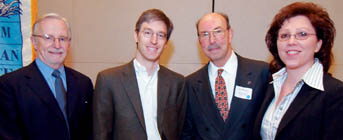 From left to right: Dean Thomas Cooley; Steven Levitt;
From left to right: Dean Thomas Cooley; Steven Levitt;
John Herzog, chairman of the Museum of American Finance and
member of the NYU Stern Board of Overseers; and Jeanne Marano, executive director of Alumni Affairs. |
NYU Stern’s Spring Author Lecture Series brought to campus authors whose works deal with rogue economics, a rogue businessman, and the connection between un-roguish behavior and economic growth.
Steven Levitt, professor of economics at the University of Chicago and author of the best-selling Freakonomics: A Rogue Economist Explores the Hidden Side of Everything, kicked off the series. Speaking to a standing-room-only crowd of Stern alumni and students, Levitt provided insight into the inspiration behind his book, while sharing further “freaky” research tidbits on topics such as the death penalty and honesty. In Freakonomics, Levitt analyzes everything from the organizational structure of drug-dealing gangs to baby-naming patterns. Underlying all these research subjects is a belief that complex phenomena can be understood with the right perspective.
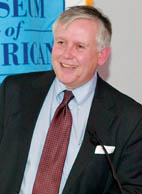 Edward Renehan
Edward Renehan |
Answering an audience member’s question on a passage in the book detailing his disapproval of the death penalty, Levitt explained that the death penalty is more political than practical. “Let’s put ourselves in the shoes of a potential murderer,” said Levitt, who in 2004 won the American Economic Association’s John Bates Clark Medal, which is given to the economist under the age of 40 who has made the greatest contribution to the discipline. “Will I not commit murder if there’s a one in 300 shot of dying 20 years from now, versus spending life in prison?”
In March, biographer Edward J. Renehan, Jr., tried to soften the historical image of his subject: 19th century financier Jay Gould. Renehan, author of The Dark Genius of Wall Street: The Misunderstood Life of Jay Gould, King of the Robber Barons, highlighted Gould's NYU connections. Gould and his family were significant donors, and his son was a graduate of the University. In fact, a Bronx library, once part of NYU’s University Heights Bronx campus, was named after him. And when Gould died in 1892 at the age of 56, the then Chancellor of NYU, Henry Mitchell MacCracken, gave the eulogy.
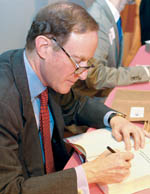 Benjamin Friedman
Benjamin Friedman |
Renehan described how Gould rose from a farm boy in the Catskills to a capitalist who controlled railroads and telegraphs. Despite his success, he developed a bad reputation as a predator who looted companies. But Renehan argued that Gould’s misdeeds have been exaggerated, noting that Gould was no worse (or better) than the other industrialists of that time, or even the “sharks” of today’s corporate world. And because of the industrialization that Gould, and other “robber barons” like J.P. Morgan and John D. Rockefeller ushered in, the nation “saw for the first time, the full economic participation of previously disenfranchised constituencies.”
The virtues of full economic participation lie at the heart of the work of Benjamin Friedman, the William Joseph Maier Professor of Political Economy at Harvard University. In May, Friedman appeared at NYU Stern to discuss his book, The Moral Consequences of Economic Growth, with an audience of Stern alumni and MBA students.
Friedman believes it’s no accident that countries liberalize politically after growing strong economies. “When the broad bulk of society is getting ahead economically and there is an increase in people’s material living standards, the society is inclined toward more open opportunity, greater tolerance along racial and religious lines, greater generosity to those who are left behind, and stronger democratic political institutions,” he said.
Friedman – who believes that if China can maintain its strong economic growth, the government will eventually democratize – warned that the democratic values of countries even as wealthy as the United States are at risk when incomes stagnate for extended periods, as they largely have in the US since 2000. Ultimately, he declared, if America is to strengthen democratic institutions around the world to diminish terrorism and social unrest, the country must aggressively promote global economic growth.
|
|
|
Top: Directors’ Institute panelist Kenneth Langone (left) with lunch keynote speaker Lawrence Bossidy.
Middle, from left to right: Moderator Martin Lipton, dinner keynote speaker Laurence Fink, and panelist William Berkley.
Bottom: Director of the Pollack Center for Law & Business William Allen. |
Pollack Center Hosts Fourth Annual Directors' Institute
The NYU Pollack Center for Law & Business, a joint initiative between NYU Stern School of Business and NYU School of Law, in May brought together a host of current and aspiring directors, experts, and practitioners at its fourth annual Directors' Institute. “The Center's hope for the Institute is that, in partnering with academics, practitioners, and regulators from the fields of business and law to have open dialogue about corporate reforms, we can strengthen the corporate governance practices of boards of directors,” said William T. Allen, director of the NYU Pollack Center for Law & Business and Nusbaum Professor of Law and Business.
In the opening dinner keynote address, Laurence D. Fink, CEO and chairman of asset management giant BlackRock, Inc., and an NYU Trustee, underscored the need for sound global economic policies: “We shouldn't set policy simply based on what's going on here [in the US], but respect what is happening globally. Global policies will determine whether the future holds sunny skies or violent storms.” Pointing to the large current account deficit, and the record level of foreign investment in US securities, Fink predicted that the US might face stormy weather because policies have been short-sighted and not sufficiently introspective. Fink urged Americans to reverse the trend in household savings, set policies that allow for incentives in long-term savings, and constructively address the issue of old-age dependency.
Honeywell International Inc.'s retired Chairman Lawrence A. Bossidy spoke about the impact of the Sarbanes-Oxley Act on investors and businesses in the luncheon keynote address. While arguing that the Act did little to curb intentional fraud, he criticized the legislation's most costly provision – Section 404. “I remain unconvinced that all the work and cost of these new regulations have brought their intended consequences or improved things for companies and their investors,” he stated. Bossidy said the cost of compliance with Section 404 has been enormous and 30 times more than the Securities and Exchange Commission initially expected, and has been especially burdensome for smaller companies.
Martin Lipton, senior partner at Wachtell, Lipton, Rosen & Katz and chairman of NYU Board of Trustees, chaired a panel on the relationship between the board and the CEO, and introduced a recurring theme: Should the role of the CEO and chairman be divided? Panelists agreed that, in most, but not all, cases, the roles should not be separated. Another important issue was posed by William R. Berkley (BS '66), chairman and CEO of W.R. Berkley Corporation, chairman of NYU Stern Board of Overseers, and an NYU Trustee. Berkley suggested that a frequent change in auditors is desirable for companies. In another panel, Kenneth G. Langone (MBA '60), chairman and CEO of Invemed Associates LLC, co-founder of Home Depot, chairman of the NYU Medical School Board of Trustees, and member of the NYU Stern Board of Overseers, hit on another common theme: Who should decide CEO compensation? Panelists recommended that compensation should be determined by the whole board, not by the compensation committee alone.


![]()